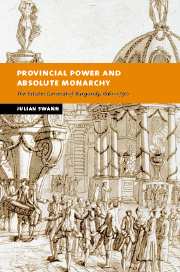Book contents
- Frontmatter
- Contents
- List of illustrations
- List of figures
- List of appendices
- List of map
- Preface
- List of abbreviations
- Map: The duchy of Burgundy in the eighteenth century
- 1 Historians, absolute monarchy and the provincial estates
- 2 Ancien régime Burgundy
- 3 The Estates General of Burgundy
- 4 Nosseigneurs les élus and the officers of the Estates
- 5 The provincial administration: authority and enforcement
- 6 ‘It's raining taxes’. Paying for the Sun King, 1661–1715
- 7 Provincial administration in an age of iron, 1661–1715
- 8 The limits of absolutism: crown, governor and the Estates in the eighteenth century
- 9 Provincial rivalries: the Estates and the Parlement of Dijon in the eighteenth century
- 10 Tax, borrow and lend: crown, Estates and finance, 1715–1789
- 11 An enlightened administration?
- 12 The coming of the French revolution in Burgundy, 1787–1789
- Conclusion
- Appendices
- Bibliography
- Index
1 - Historians, absolute monarchy and the provincial estates
Published online by Cambridge University Press: 05 July 2009
- Frontmatter
- Contents
- List of illustrations
- List of figures
- List of appendices
- List of map
- Preface
- List of abbreviations
- Map: The duchy of Burgundy in the eighteenth century
- 1 Historians, absolute monarchy and the provincial estates
- 2 Ancien régime Burgundy
- 3 The Estates General of Burgundy
- 4 Nosseigneurs les élus and the officers of the Estates
- 5 The provincial administration: authority and enforcement
- 6 ‘It's raining taxes’. Paying for the Sun King, 1661–1715
- 7 Provincial administration in an age of iron, 1661–1715
- 8 The limits of absolutism: crown, governor and the Estates in the eighteenth century
- 9 Provincial rivalries: the Estates and the Parlement of Dijon in the eighteenth century
- 10 Tax, borrow and lend: crown, Estates and finance, 1715–1789
- 11 An enlightened administration?
- 12 The coming of the French revolution in Burgundy, 1787–1789
- Conclusion
- Appendices
- Bibliography
- Index
Summary
THE ‘WHIG INTERPRETATION’ OF FRENCH HISTORY
After witnessing the rise and often rapid fall of three monarchies, two empires, five republics and the Vichy regime in the space of less than two centuries, the French people can be forgiven a certain scepticism about the durability of both their rulers and the country's political institutions. Yet through the ruins and debris left by kings, emperors and politicians of every hue, the French have long been able to seek solace in the fact that the state went on forever. The existence of a strong, centralised bureaucracy, simultaneously loved and loathed by the public, supplied a sense of permanence and reliability denied to the mere mortals who flitted across the political stage. Since at least the early nineteenth century, veneration of the state and a belief in its centralising mission has formed an important part of French national identity. It offered a force for unity that a divided and politically traumatised people could cling to, and, not surprisingly, scholars looked back beyond 1789 in search of its origins. The result was what we might describe as the French version of the Whig school of history. Whereas the British exponents of that school believed that the history of their country could be written in terms of a long and triumphant march from the Magna Carta to parliamentary democracy, the French saw a no less inexorable rise of the state.
Information
- Type
- Chapter
- Information
- Provincial Power and Absolute MonarchyThe Estates General of Burgundy, 1661–1790, pp. 1 - 25Publisher: Cambridge University PressPrint publication year: 2003
Accessibility standard: Unknown
Why this information is here
This section outlines the accessibility features of this content - including support for screen readers, full keyboard navigation and high-contrast display options. This may not be relevant for you.Accessibility Information
- 1
- Cited by
